Sustainable Sugarcane Initiative (SSI)
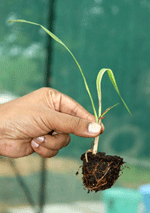 India is the second largest sugarcane producer in the world. The annual turnover of Indian Sugar Industry is estimated at INR 80,000 crore (USD$12.25 billion) and represents the principal livelihood of 50 million farmers and their familiesand provides direct employment to over 5 lakh skilled and semi-skilled persons in sugar mills and related industries.There are 732 installed sugar factories in the country as on 31.07.2017, with sufficient crushing capacity to produce around 339 lakh MT of sugar.
India is the second largest sugarcane producer in the world. The annual turnover of Indian Sugar Industry is estimated at INR 80,000 crore (USD$12.25 billion) and represents the principal livelihood of 50 million farmers and their familiesand provides direct employment to over 5 lakh skilled and semi-skilled persons in sugar mills and related industries.There are 732 installed sugar factories in the country as on 31.07.2017, with sufficient crushing capacity to produce around 339 lakh MT of sugar.
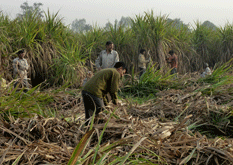 Yet sugarcane cultivation and the sugar industry in India are facing serious economic, environmental, and social challenges. Even as raw sugar prices are rising, increasing costs of cultivation and poor yields are making sugarcane cultivation economically unviable for farmers. The problem is further aggravated by the low Support Minimum Price offered by the government, which has production costs surpassing incomes. Environmental issues like declining water table and degradation of soil pose major threats to cane farmers. As a result, smallholder farmers are shifting to more profitable crops, leading to sharp falls in sugarcane area.
Yet sugarcane cultivation and the sugar industry in India are facing serious economic, environmental, and social challenges. Even as raw sugar prices are rising, increasing costs of cultivation and poor yields are making sugarcane cultivation economically unviable for farmers. The problem is further aggravated by the low Support Minimum Price offered by the government, which has production costs surpassing incomes. Environmental issues like declining water table and degradation of soil pose major threats to cane farmers. As a result, smallholder farmers are shifting to more profitable crops, leading to sharp falls in sugarcane area.
Challenges to the Sugarcane Industry
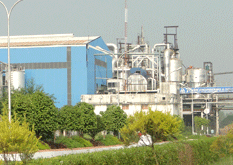 Sugar mills face multiple problems. Sugarcane area is dwindling, leading to under-utilization of crushing machines, from inadequate supplies of canes. Competition from more profitable crops like rice and maize makes it difficult to convince farmers to accept the low price offered by mills. An increase in Jaggery prices is also threatening cane supplies to mills. Due to a high seed rate and insufficient availability of quality seed material, coverage of target areas is difficult. Low sugar recovery, inspite of various efforts has become one of the biggest problems the sugar industry is facing. Another problem is labour scarcity, especially at the time of harvest. And where labour is available, labourers demand high wages. Mechanization is not possible due to the close spacing of seeds in conventional planting.
Sugar mills face multiple problems. Sugarcane area is dwindling, leading to under-utilization of crushing machines, from inadequate supplies of canes. Competition from more profitable crops like rice and maize makes it difficult to convince farmers to accept the low price offered by mills. An increase in Jaggery prices is also threatening cane supplies to mills. Due to a high seed rate and insufficient availability of quality seed material, coverage of target areas is difficult. Low sugar recovery, inspite of various efforts has become one of the biggest problems the sugar industry is facing. Another problem is labour scarcity, especially at the time of harvest. And where labour is available, labourers demand high wages. Mechanization is not possible due to the close spacing of seeds in conventional planting.
Problems of Sugarcane Growers
- Rising cost of cultivation
- Low market price
- Water table depleting year after year (1500-3000 litres/1 kg of cane)
- Unavailability of good quality seed material
- Increased pest, pathogen pressure and negligence in plant protection measures
- Improper cultivation practices
- Imbalanced nutrient management and other practices like mono cropping often result in low productivity
- Unpredictable climatic aberrations
Issues with millers
- Poor recovery
- Short crushing season: All the cane planted almost same time so pressure on machinery, resources
- Fluctuating yields
- Price fluctuations Result: Low profitability, lack of proper use of resources
Promising Solutions - The Sustainable Sugarcane Initiative (SSI)
The Sustainable Sugarcane Initiative (SSI) is an innovative set of agronomic practices that involves using less seeds, raising seeds in a nursery, and following new planting methods, with wider seed spacing, and better water and nutrient management to increase the cane yields significantly.
SSI methods can increase sugarcane yields by at least 20% with 30% less water and a 25% reduction in chemical inputs.
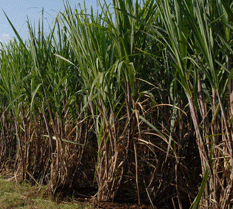 The SSI method of sugarcane cultivation was evolved from the principles of ‘More with Less’ followed in SRI (System of Rice Intensification) and introduced in India by the WWF-ICRISAT collaborative project in 2009.
The SSI method of sugarcane cultivation was evolved from the principles of ‘More with Less’ followed in SRI (System of Rice Intensification) and introduced in India by the WWF-ICRISAT collaborative project in 2009.
Benefits of SSI to farmers
- Less seed: Saving in seed material
- Healthy seedling of 25-35 days old from nursery
- Wide spacing: Go for inter cropping
- Water saving: Easy for drip, low cost
- Less cost for transplantation
- Adapting to new varieties
- Intercrop provides an additional income
Benefits of SSI to millers
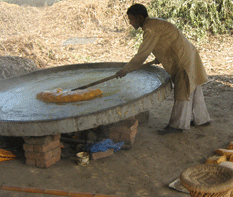
- Increase recovery
- Improves the raw material supply
- Improves the profitability.
- Increases the efficiency of mills- more systematic supply during the season.
To address the problems of the sugar industry, write to AgSri: info@agsri.com
A SSI-google group has been initiated for information sharing and exchange on sugarcane cultivation. We invite you to join this group by following the link: http://groups.google.com/group/SSI-India

